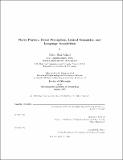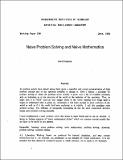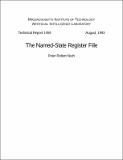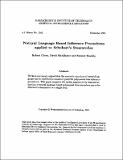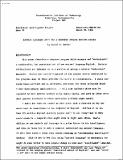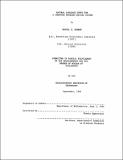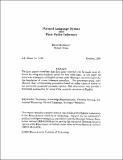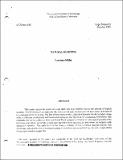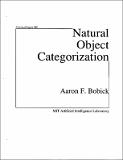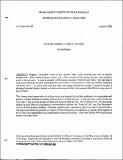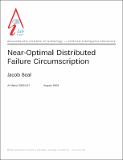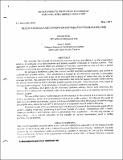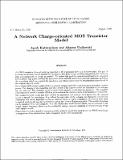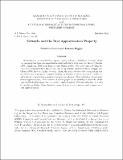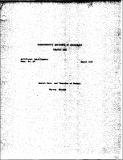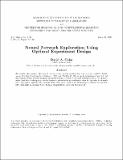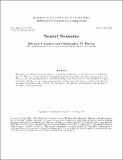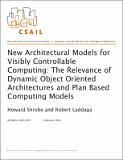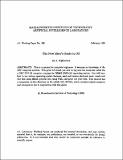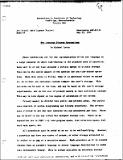Browsing Artificial Intelligence Lab Publications by Title
Now showing items 999-1018 of 1835
-
Naive Physics, Event Perception, Lexical Semantics, and Language Acquisition
(1993-04-01)This thesis proposes a computational model of how children may come to learn the meanings of words in their native language. The proposed model is divided into two separate components. One component produces semantic ... -
Naive Problem Solving and Naive Mathematics
(MIT Artificial Intelligence Laboratory, 1983-06)AI problem solvers have almost always been given a complete and correct axiomatization of their problem domain and of the operators available to change it. Here I discuss a paradigm for problem solving in which the problem ... -
The Named-State Register File
(1993-08-01)This thesis introduces the Named-State Register File, a fine-grain, fully-associative register file. The NSF allows fast context switching between concurrent threads as well as efficient sequential program performance. ... -
Natural Language Based Inference Procedures Applied to Schubert's Steamroller
(1991-12-01)We have previously argued that the syntactic structure of natural language can be exploited to construct powerful polynomial time inference procedures. This paper supports the earlier arguments by demonstrating that a ... -
Natural Language Input for a Computer Problem Solving System
(1964-03-01)This paper describes a computer program which accepts and "understands" a comfortable, but restricted set of one natural language, English. Certain difficulties are inherent in this problem of making a machine "understand" ... -
Natural Language Input for a Computer Problem Solving System
(1964-09-01)The STUDENT problem solving system, programmed in LISP, accepts as input a comfortable but restricted subset of English which can express a wide variety of algebra story problems. STUDENT finds the solution to a large ... -
Natural Language Syntax and First Order Preference
(1989-10-01)We have argued elsewhere that first order inference can be made more efficient by using non-standard syntax for first order logic. In this paper we show how a fragment of English syntax under Montague semantics provides ... -
Natural Learning
(1981-10-01)This memo reports the results of a case study into how children learn in the absence of explicit teaching. The three subjects, an eight year old, a ten year old and a thirteen year old were observed in both of two ... -
Natural Object Categorization
(1987-11-01)This thesis addresses the problem of categorizing natural objects. To provide a criteria for categorization we propose that the purpose of a categorization is to support the inference of unobserved properties of objects ... -
Nature Abhors an Empty Vacuum
(1981-08-01)Imagine a crystalline world of tiny, discrete "cells", each knowing only what its nearest neighbors do. Each volume of space contains only a finite amount of information, because space and time come in discrete units. ... -
Near-Optimal Distributed Failure Circumscription
(2003-08-11)Small failures should only disrupt a small part of a network. One way to do this is by marking the surrounding area as untrustworthy --- circumscribing the failure. This can be done with a distributed algorithm using ... -
Negotiation as a Metaphor for Distributed Problem Solving
(1981-05-01)We describe the concept of distributed problem solving and define it as the cooperative solution of problems by a decentralized and loosely coupled collection of problem solvers. This approach to problem solving offers ... -
A Network Charge-Orineted MOS Transistor Model
(1995-08-01)The MOS transistor physical model as described in [3] is presented here as a network model. The goal is to obtain an accurate model, suitable for simulation, free from certain problems reported in the literature [13], and ... -
Networks and the Best Approximation Property
(1989-10-01)Networks can be considered as approximation schemes. Multilayer networks of the backpropagation type can approximate arbitrarily well continuous functions (Cybenko, 1989; Funahashi, 1989; Stinchcombe and White, 1989). We ... -
Neural Nets and Theories of Memory
(1963-03-01)A number of models developed in work often called "neural-net" research may be of interest to physiologists working on the problem of memory. From this work comes a variety of ideas on how networks of neuron-like elements ... -
Neural Network Exploration Using Optimal Experiment Design
(1994-06-01)We consider the question "How should one act when the only goal is to learn as much as possible?" Building on the theoretical results of Fedorov [1972] and MacKay [1992], we apply techniques from Optimal Experiment ... -
Neural Networks
(1996-03-13)We present an overview of current research on artificial neural networks, emphasizing a statistical perspective. We view neural networks as parameterized graphs that make probabilistic assumptions about data, and view ... -
New Architectural Models for Visibly Controllable Computing: The Relevance of Dynamic Object Oriented Architectures and Plan Based Computing Models
(2004-02-09)Traditionally, we've focussed on the question of how to make a system easy to code the first time, or perhaps on how to ease the system's continued evolution. But if we look at life cycle costs, then we must conclude ... -
The New Idiot's Guide to OZ
(MIT Artificial Intelligence Laboratory, 1988-02)This is a manual for complete beginners. It assumes no knowledge of the MIT computer systems. This guide will teach you how to log onto the computer called OZ, a DEC PDP-20 computer running the TWENEX (TOPS-20) operating ... -
New Language Storage Conventions
(1964-05-01)These conventions are for the implementation of the new language on a large computer on which time-sharing is the standard role of operation. Each user is at any time asigned a certain amount of primary storage. This ...

